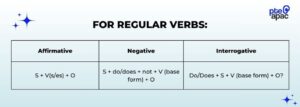Present Simple Tense

277
The Present Simple tense is one of the most basic tenses in English, easy to learn and use. Understanding and correctly using this tense helps you avoid common mistakes and lays a solid foundation for learning advanced grammar. Let’s explore the details of the Present Simple tense with PTE APAC, including the formula, usage, and identifying signs, along with practice exercises to help you apply it accurately and effectively.

1. What is Present Simple Tense
The Present Simple tense is one of the most basic and common tenses in English. It is used to describe actions that occur frequently, repeatedly, or universal truths and facts. This is the simplest tense and is used extensively in daily communication.
2. Present Simple Tense Formula
- For Regular Verbs:
| Affirmative | Negative | Interrogative |
| S + V(s/es) + O | S + do/does + not + V (base form) + O | Do/Does + S + V (base form) + O? |
| “S” (Subject) is the subject. “V” (Verb) is the verb. “O” (Object) is the object. | ||
| Add “s” or “es” to the verb when the subject is the third person singular (he, she, it). | “Do” is used with subjects I, you, we, they. “Does” is used with the third person singular subjects (he, she, it). | |
| Ví dụ: I play football every day. She plays football every day. | Ví dụ: I do not (don’t) play football every day. He does not (doesn’t) play football every day. | Ví dụ: Do you play football every day? Does she play football every day? |

- For the Verb “To Be”:
| Affirmative | Negative | Interrogative |
| S + am/is/are + O | S + am/is/are + not + O | Am/Is/Are + S + O? |
| “Am” is used with the subject “I.” “Is” is used with the third person singular subjects (he, she, it). “Are” is used with the subjects you, we, they. | ||
| Ví dụ: I am a student. She is a teacher. They are friends. | Ví dụ: I am not a student. She is not (isn’t) a teacher. They are not (aren’t) friends. | Ví dụ: Am I a student? Is she a teacher? Are they friends? |
3. Identifying Signs of the Present Simple Tense
The Present Simple tense is often accompanied by adverbs of frequency or time phrases such as:
Adverbs of frequency: always, usually, often, sometimes, rarely, never.
Time phrases: every day, every week, every month, on Mondays, at the weekend.
Examples:
She usually goes to the gym after work. (Cô ấy thường đi tập gym sau giờ làm việc.)
They play tennis every Sunday. (Họ chơi tennis vào mỗi Chủ Nhật.)
>>For more details:Present Simpple tense exercises with answers
4. Usage of the Present Simple Tense
- To describe a habit or repeated action:
Example: She walks to school every day.
- To state an obvious fact or truth:
Example: The Earth orbits the Sun.
- To describe a fixed schedule or timetable:
Example: The train leaves at 7 AM.
5. Practice Exercises for the Present Simple Tense
Exercise 1: Conjugate the Verbs in the Present Simple Tense
- She (go) ____ to school every day.
- They (not/play) ____ football on Sundays.
- (you/like) ____ ice cream?
- He (study) ____ English every evening.
- The sun (rise) ____ in the east.
- They (not/watch) ____ TV on weekdays.
- (he/work) ____ at the hospital?
- Water (boil) ____ at 100 degrees Celsius.
- We (visit) ____ our grandparents every month.
- My mother (cook) ____ dinner every night.
Exercise 2: Write Negative and Interrogative Sentences in the Present Simple Tense
- She plays the piano.
- Negative: __________________________
- Interrogative: _______________________
- They are friends.
- Negative: __________________________
- Interrogative: _______________________
- He drinks coffee every morning.
- Negative: __________________________
- Interrogative: _______________________
- The bus leaves at 7 AM.
- Negative: __________________________
- Interrogative: _______________________
- She is a teacher.
- Negative: __________________________
- Interrogative: _______________________
Exercise 3: Choose the Correct Answer
- She always (go/goes) to the gym after work.
- They (is/are) friends.
- He (do/does) not like chocolate.
- The movie (start/starts) at 8 PM.
- My father (work/works) in a factory.
- We (play/plays) football every weekend.
- The earth (revolve/revolves) around the sun.
- She (study/studies) very hard.
- They (not/live) in the city.
- (you/like) this song?
Exercise 4: Complete the Sentences with the Correct Verb Form
- My sister (read) ____ books in the evening.
- They (not/go) ____ to the park on Sundays.
- (your brother/play) ____ the guitar?
- We (have) ____ dinner at 7 PM every day.
- The store (open) ____ at 9 AM.
- She (not/eat) ____ meat.
- (they/speak) ____ English fluently?
- He (watch) ____ TV every night.
- I (do) ____ my homework after school.
- The train (arrive) ____ at 6 PM.
Exercise 5: Write Correct Sentences
- She / usually / go / to the gym.
- They / always / have / breakfast / at 7 AM.
- He / never / play / football.
- The sun / rise / in the east.
- We / often / visit / our grandparents.
- My father / work / in a factory.
- She / study / English / every day.
- The bus / leave / at 8 AM.
- They / not / watch / TV / on weekdays.
- Water / boil / at 100 degrees Celsius.
Answers
Exercise 1: Conjugate the Verbs
- She (go) goes to school every day.
- They (not/play) do not play football on Sundays.
- (you/like) Do you like ice cream?
- He (study) studies English every evening.
- The sun (rise) rises in the east.
- They (not/watch) do not watch TV on weekdays.
- (he/work) Does he work at the hospital?
- Water (boil) boils at 100 degrees Celsius.
- We (visit) visit our grandparents every month.
- My mother (cook) cooks dinner every night.
Exercise 2: Write Negative and Interrogative Sentences
- He reads a book.
- Phủ định: He does not read a book.
- Nghi vấn: Does he read a book?
- They are friends.
- Phủ định: They are not friends.
- Nghi vấn: Are they friends?
- He drinks coffee every morning.
- Phủ định: He does not drink coffee every morning.
- Nghi vấn: Does he drink coffee every morning?
- The bus leaves at 7 AM.
- Phủ định: The bus does not leave at 7 AM.
- Nghi vấn: Does the bus leave at 7 AM?
- She is a teacher.
- Phủ định: She is not a teacher.
- Nghi vấn: Is she a teacher?
Exercise 3: Choose the Correct Answer
- She always (go/goes) goes to the gym after work.
- They (is/are) are friends.
- He (do/does) does not like chocolate.
- The movie (start/starts) starts at 8 PM.
- My father (work/works) works in a factory.
- We (play/plays) play football every weekend.
- The earth (revolve/revolves) revolves around the sun.
- She (study/studies) studies very hard.
- They do not live (not/live) in the city.
- Do you like (you/like) this song?
Exercise 4: Complete the Sentences
- My sister (read) reads books in the evening.
- They (not/go) do not go to the park on Sundays.
- (your brother/play) Does your brother play the guitar?
- We (have) have dinner at 7 PM every day.
- The store (open) opens at 9 AM.
- She (not/eat) does not eat meat.
- (they/speak) Do they speak English fluently?
- He (watch) watches TV every night.
- I (do) do my homework after school.
- The train (arrive) arrives at 6 PM.
Exercise 5: Write Correct Sentences
- She usually goes to the gym.
- They always have breakfast at 7 AM.
- He never plays football.
- The sun rises in the east.
- We often visit our grandparents.
- My father works in a factory.
- She studies English every day.
- The bus leaves at 8 AM.
- They do not watch TV on weekdays.
- Water boils at 100 degrees Celsius.
>> For more: Present Perfect Tense
Conclusion
The Present Simple tense is a crucial foundation in learning English. Understanding its formula, identifying signs, and usage will help you use it proficiently and confidently in daily communication. Practice the Present Simple tense regularly to master this essential knowledge
ARTICLE CATEGORIES





